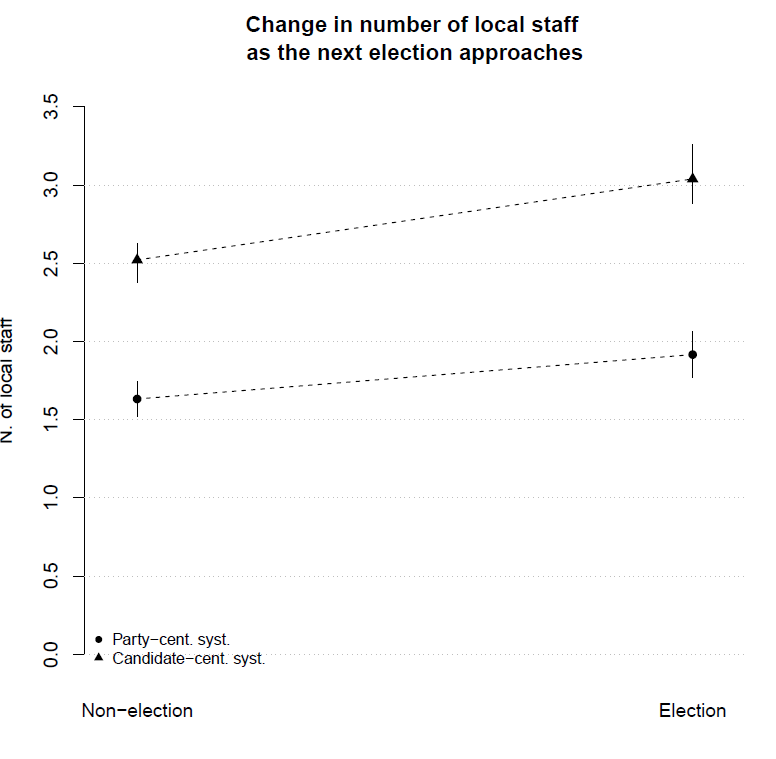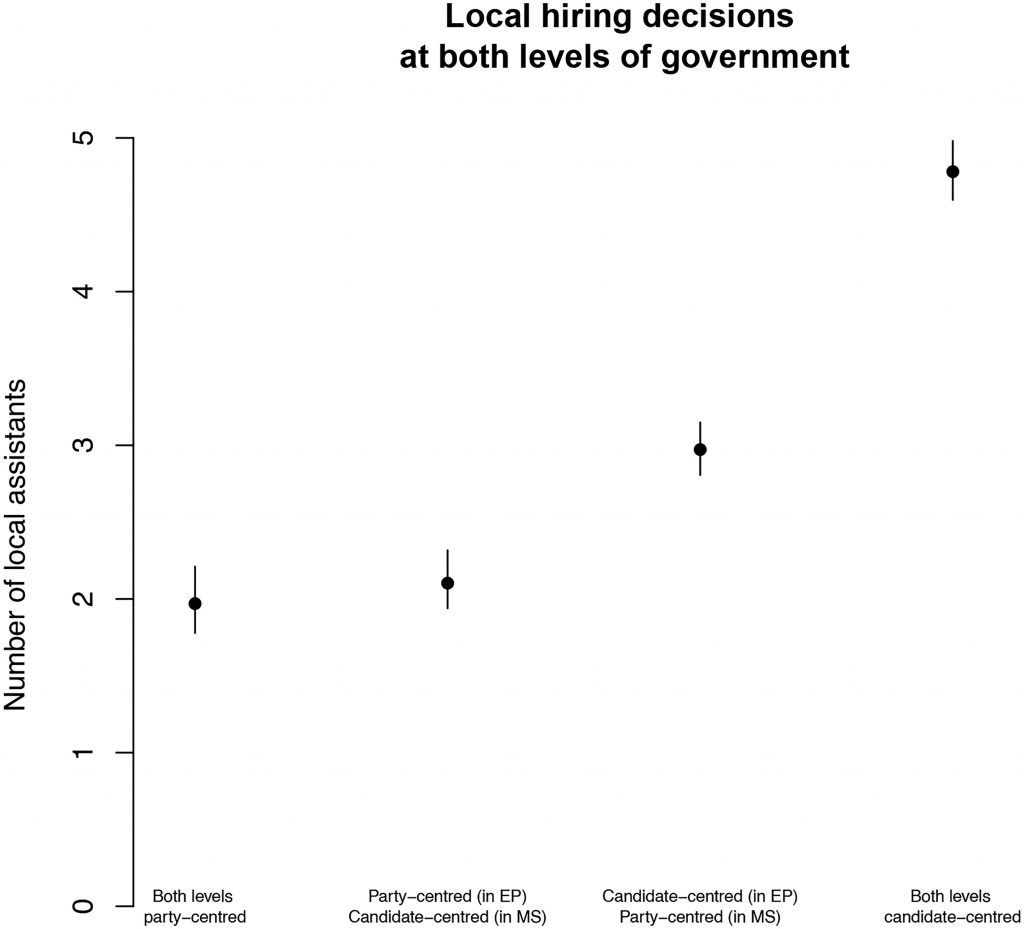Members of the European Parliament receive public money to hire personal staff. But what role do these staff play in improving the representation of EU citizens? Drawing on new research, Silje S. L. Hermansen and Andreja Pegan find that the number of staff employed by MEPs in their local constituencies increases significantly in the leadup to European and national elections. This raises important questions about whether these staff are aiding the work of the European Parliament or simply furthering the career ambitions of politicians.
Stories on the people that work for Members of Parliament (MPs) have long captivated the attention of TV audiences in shows such as Yes Minister, House of Cards and Parlement. Yet the unelected people working for MPs have never been prime-time material in scholarly literature. The most recent corruption scandal in the European Parliament also involved personal staff, clearly showing the relevance of understanding these unelected actors.
The best staffed legislature in Europe
Members of the European Parliament (MEPs) receive public money to employ personal staff to help them develop policies, monitor the executive, and represent citizens. The European Parliament is the best-staffed legislature in Europe, where parliamentarians can spend up to €26,734 per month on personal staffing.
Two types of staffers are financed via this budget: ‘parliamentary (accredited) assistants’ deal with matters in Brussels and Strasbourg, while ‘local staff’ work in the member state, helping MEPs carry out constituency work. Most MEPs rely on a mix of the two. However, local staff are the best placed to assist MEPs in their representation function since they reside in the constituency and are in contact with media, domestic institutions, and citizens.
Why do MPs need personal staff?
Staff empower the European Parliament vis-à-vis other – non-elected – EU institutions. They also facilitate MEPs to connect with European citizens; a step closer to mending the purported EU democratic deficit.
Personal staff are not the only ones assisting parliamentarians (party groups have their own staff, and so does the European Parliament as an institution). However, they are important because they are recruited at MEPs’ discretion, giving them independence from party groups and particular interests.
In short, staff are key to an effective democracy. Yet, the recruitment arrangements and electoral context surrounding their hiring can affect the extent to which MEPs’ staffers contribute to parliamentary representation.
What could go wrong?
Local staff help MEPs voice citizens’ grievances, cultivate trust, and link citizens with representative institutions. They can be considered a proxy for MEPs’ investment in constituency work and citizen representation. However, local staff are hired under national labour laws with limited institutional monitoring from the EU.
Over the years, we have witnessed scandals relating to the staff allowance, ranging from MEPs hiring personal staff for national party needs in France among centrists and radicals, to Nigel Farage facing claims the funds were essentially being used to campaign for Brexit. Yet, the local staff funding can also be spent in legal ways that promote MEPs’ national and European political careers. This is an inadvertent effect of staff allowances because it is not related to MEPs’ parliamentary representation but to their electoral career ambitions.
To understand how career ambitions and the electoral context affect representation, we have traced the local staff hires by 1,174 MEPs over five years (2012-2017). As suggested in Figure 1, MEPs hire more local staff in the period before European elections.
Figure 1: European elections and MEPs’ local staff
Note: For more information, see the authors’ accompanying paper in European Union Politics
Moreover, the same thing happens in the context of national elections (Figure 2), indicating that allowances at the EU level are used to aid national election campaigns. Overall, it seems that the European Parliament incidentally finances political careers inside and outside the EU sphere, casting some doubt on the effectiveness of local staff in contributing to the EU-citizen link.
Figure 2: National elections and MEPs’ locals staff
Note: For more information, see the authors’ accompanying paper in European Union Politics
The need for personal votes
Examining how MEPs mobilise local staff before European and national elections, we find substantial differences depending on the member state that MEPs are elected in and the electoral rules that apply to the electoral contest.
Electoral rules for European elections vary between member states, which creates different needs among MEPs to hire local staff. The extent to which MEPs engage in constituency work is connected to their need for personal votes to win elections. Voters want legislators that promote their policy interests, but they often lack information about whether this actually happens. Constituency work is a means for politicians to signal that commitment to voters.
Indeed, we find that MEPs whose elections depend on personal votes (i.e. elected via a candidate-centred system where voters cast preferential votes) keep a large local staff presence (Figure 3).
Figure 3: Local staff and the need to cultivate personal votes
Note: For more information, see the authors’ accompanying paper in European Union Politics
This was expected, but the absence of a common electoral system for European elections creates differences in how EU citizens are represented across the EU. Because MEPs are elected following different electoral rules, their ‘home style’ for hiring local staff varies, with potential impacts on citizen representation in the EU.
Local staff and the link between the European Parliament and citizens
In recent years, the European Parliament has invested considerable resources for MEPs to act as strong links between citizens and the EU. Our analysis shows that such a link is difficult to realise without considering MEPs’ ambitions and electoral incentives.
The single allowance system for all MEPs produces very different effects depending on the electoral system in the member states. Given the electoral rules, some citizens have more access to MEPs through local staff and thus have better opportunities for representation than others.
More worrying is that MEPs’ behaviour for hiring local staff is also conditioned on electoral incentives stemming from national elections. This means that the funds the EU appropriates for hiring MEPs’ local staff may bypass parliamentary representation at the EU level in favour of the national political arena.
How to fix it?
There is no fix-all solution to the problems of political representation in the EU. We need to better understand MEPs’ representative function in their constituency, which is at least partly performed by local staff. This raises the question of what activities local staff perform in their constituency and how these activities vary given the electoral cycle.
The European Parliament also needs greater transparency, including revealing and monitoring how MEPs spend their staff allowance. If staff allowances are to ameliorate the representation of EU citizens, then rules governing them should consider electoral cycles, both for European and national elections.
For more information, see the authors’ accompanying open access paper in European Union Politics
Note: This article gives the views of the authors, not the position of EUROPP – European Politics and Policy or the London School of Economics. Featured image credit: CC-BY-4.0: © European Union 2022– Source: EP






